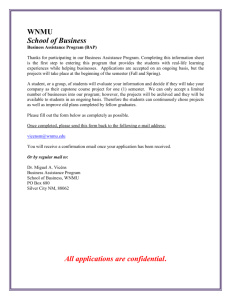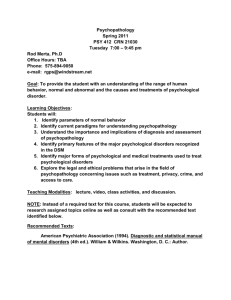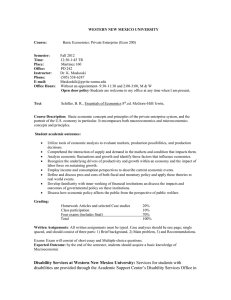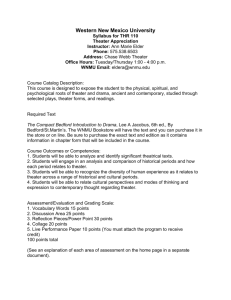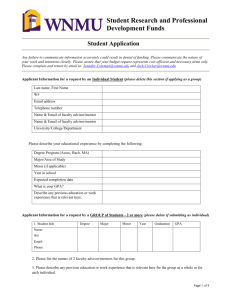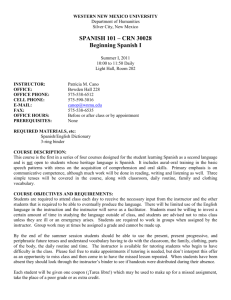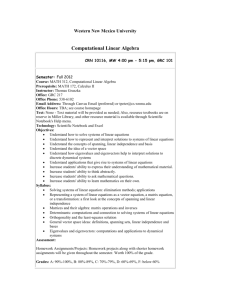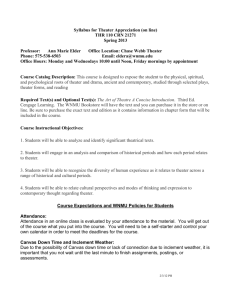CJUS 352 10323 - Western New Mexico University
advertisement
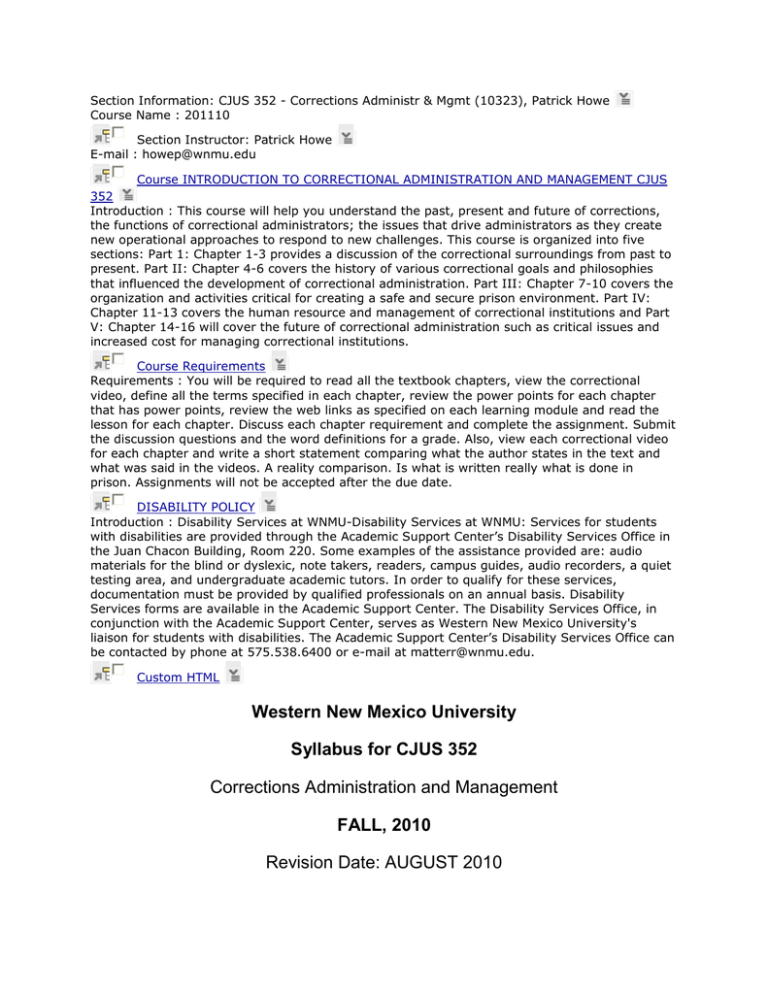
Section Information: CJUS 352 - Corrections Administr & Mgmt (10323), Patrick Howe Course Name : 201110 Section Instructor: Patrick Howe E-mail : howep@wnmu.edu Course INTRODUCTION TO CORRECTIONAL ADMINISTRATION AND MANAGEMENT CJUS 352 Introduction : This course will help you understand the past, present and future of corrections, the functions of correctional administrators; the issues that drive administrators as they create new operational approaches to respond to new challenges. This course is organized into five sections: Part 1: Chapter 1-3 provides a discussion of the correctional surroundings from past to present. Part II: Chapter 4-6 covers the history of various correctional goals and philosophies that influenced the development of correctional administration. Part III: Chapter 7-10 covers the organization and activities critical for creating a safe and secure prison environment. Part IV: Chapter 11-13 covers the human resource and management of correctional institutions and Part V: Chapter 14-16 will cover the future of correctional administration such as critical issues and increased cost for managing correctional institutions. Course Requirements Requirements : You will be required to read all the textbook chapters, view the correctional video, define all the terms specified in each chapter, review the power points for each chapter that has power points, review the web links as specified on each learning module and read the lesson for each chapter. Discuss each chapter requirement and complete the assignment. Submit the discussion questions and the word definitions for a grade. Also, view each correctional video for each chapter and write a short statement comparing what the author states in the text and what was said in the videos. A reality comparison. Is what is written really what is done in prison. Assignments will not be accepted after the due date. DISABILITY POLICY Introduction : Disability Services at WNMU-Disability Services at WNMU: Services for students with disabilities are provided through the Academic Support Center’s Disability Services Office in the Juan Chacon Building, Room 220. Some examples of the assistance provided are: audio materials for the blind or dyslexic, note takers, readers, campus guides, audio recorders, a quiet testing area, and undergraduate academic tutors. In order to qualify for these services, documentation must be provided by qualified professionals on an annual basis. Disability Services forms are available in the Academic Support Center. The Disability Services Office, in conjunction with the Academic Support Center, serves as Western New Mexico University's liaison for students with disabilities. The Academic Support Center’s Disability Services Office can be contacted by phone at 575.538.6400 or e-mail at matterr@wnmu.edu. Custom HTML Western New Mexico University Syllabus for CJUS 352 Corrections Administration and Management FALL, 2010 Revision Date: AUGUST 2010 ________________________________________ Instructor PATRICK HOWE Work Phone: 575-534-0206 Home: 575-534-0206 Address: 8 COPPER RIDGE DRIVE, SILVER CITY, NM Office Hours: WNMU E-mail: howep@wnmu.edu Course Catalog Description: Corrections Administration and Management. A survey of theory and practice in corrections management. Principles of organization and operation of correctional centers will be addressed with emphasis on program development, leadership and supervision, decision-making, policy formulation, planned change, and human resource management. Instructional Objectives: This course is designed to give the student a grounding in prison administration, public administration and policy making in the arena of corrections. Students should gain an understanding of the evolution of the American prison system, the evolution of punishment and treatment, various approaches to theory of corrections policy and administration, issues in prison reform, community-based corrections and new trends in correctional administration. Upon completion of this course, students will: 1. Be familiar with the United States Prison System, its history and its future. 2. Be familiar with the internal operations of a prison environment 3. Have an excellent understanding of correctional administration and be prepared to work within this type of environment. . . Required Text: Seiter, Richard P. (2002). Correctional Administration: Integrating Theory and Practice, Upper Saddle River, New Jersey. Prentice Hall. ISBN: 013087147 . Required Equipment & Paperwork 1. Computer 2.p Web access Additional Requirements: 1. Outside reading as determined by the instructor and reviewing video programs which are in conjunction to certain chapters in the text. Grading Scale: A = 90-100 B = 80-89 C = 70-79 D = 60-69 F = 59 or less ________________________________________ Course Expectations and WNMU Policies for Students: Attendance: Attendance in an online class is evaluated by your attendance to the material. You will get out of the course what you put into the course. You will need to be a “self-starter” and control your own calendar in order to meet the deadlines for the course. Blackboard Down Time/ Inclement Weather: Due to the possibility of Blackboard down time or lack of connection due to inclement weather, it is important that you not wait until the last minute to finish assignments, posting, or assessments. Posting Assignments and Discussions: The student is responsible for posting all discussions on discussion board and all assignments to the assignment posting area. If you are having difficulty with this, it is your responsibility to contact me so that I can get you the assistance you need to learn how to do this. Assignment Due Dates: ALL ASSIGNMENTS ARE DUE BY THE DUE DATE. ASSIGNMENTS WILL NOT BE ACCEPTED NOR GRADED AFTER THE DUE DATE. IT IS VERY IMPORTANT FOR YOU TO STAY ON SCHEDULE BECAUSE IT HAS RAMIFICATIONS BOTH TO YOU AND THE INSTRUCTOR. Informed Consent: Some individuals may choose to disclose personal information during class. Therefore, it is important that all classmates agree not to discuss or write about what others have discussed in class. Professionalism: Students are learning professional skills and are expected to engage in classroom discussions, complete reading assignments, and turn in assignments in a timely fashion as befitting professional behavior. Scholarly Writing: Use clear college level writing with correct spelling and grammar for all assignments. If you need help in writing, check with the WNMU Online Writing Center. Communications policy statement regarding official e-mail: WNMUs policy requires that all official communication be sent via Mustang Express. As a result, all emails related to your enrollment at WNMU and class communication – including changes in assignments and grades – will be sent to your wnmu.edu e-mail address. It is very important that you access your Mustang Express e-mail periodically to check for correspondence from the University. If you receive most of your e-mail at a different address, you can forward your messages from Mustang Express to your other address. Example - Martin Classmember was assigned a WNMU e-mail address of classmemberm12@wnmu.edu but Martin would rather receive his emails at his home address of martinclass@yahoo.com Martin would follow the direction provided at http://www.wnmu.edu/campusdocs/direction%20for%20forwarding%20email.htm WNMU policy on email passwords: WNMU requires that passwords for access to all of the protected software, programs, and applications will be robust, including complexity in the number of characters required, the combination of characters required, and the frequency in which passwords are required to be changed. Minimum complexity shall include: • Passwords shall contain at least six (6) characters • Passwords shall contain at least one capital (upper case) letter, and at least one numeral. • Passwords shall be changed at least every 90 days (8/6/08) Academic Integrity: Each student shall observe standards of honesty and integrity in academic work as defined in the WNMU catalog. Violations of academic integrity include “any behavior that misrepresents or falsifies a student’s knowledge, skills or ability with the goal of unjustified or illegitimate evaluation or gain” (WNMU Faculty Handbook, 2008). Generally violations of academic integrity include cheating and plagiarism. Refer to the catalog for definitions. Penalties for infractions are as follows: For Plagiarism: “the intentional or unintentional representation of another’s work as one’s own without proper acknowledgement of the original author or creator of the work” (WNMU Faculty Handbook, 2008): 1st infraction: Grade of “0” for assignment; 2nd infraction: dismissal from the class with grade of “F”. For Cheating: “using or attempting to use unauthorized materials and unauthorized collaboration with others, copying the work of another or any action that presents the work of others to misrepresent the student’s knowledge” (WNMU Faculty Handbook, 2008): 1st infraction: dismissal from class with grade of “F”. Special Needs Students: Students with disabilities in need of accommodation should register with the Special Needs Office (JUANCB 210, Phone: 575-538-6498) at the beginning of the semester. With student permission, that office will notify instructors of any special equipment or services a student requires. Integrated Use of Technology: You will be using Blackboard Vista to take all quizzes and exams and to post all assignments. You will need to learn how to attach documents if you don’t already know how to do this. Need Help? 1. Post a question to the Discussion Board. There is no such thing as a dumb question. 2. Post a question as a Bb-Vista e-mail to your instructor. 3. If the Bb-Vista system goes down or you have other technical questions, contact the WNMU Help Desk: helpdesk@wnmu.edu or (575) 574-4357. 4. Go to the Bb-Vista Student Resources page: http://www.wnmuonline.net/osr Term Access : Access to online course materials will only be available to students until date listed for the last day of class meeting in the WNMU Schedule of Classes. Caveats: The schedule and procedures in this course are subject to change in the event of extenuating circumstances. Copyright: The materials found in this course are only for the use of students enrolled in this course for purposes associated with this course and may not be retained by students in any electronic form or further disseminated or distributed to anyone not enrolled in this course.
